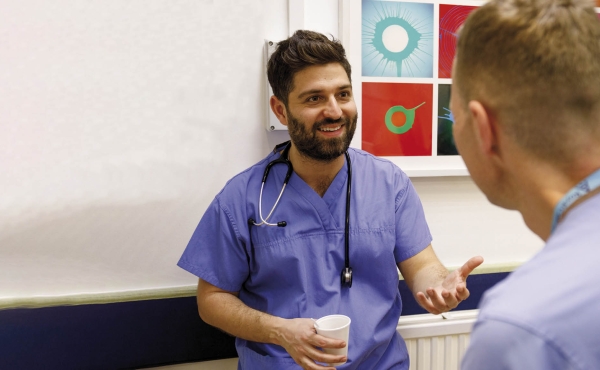Workplace wellbeing
Workplace wellbeing
We produce a range of resources to support wellbeing in the workplace. We also campaign nationally on issues that affect your wellbeing at work.
Our members tell us that working in a supportive environment is one of the key factors that supports their wellbeing at work. We use our influence to address national issues that affect workforce wellbeing and to help you improve your own workplace.
Expanding the anaesthetic workforce
Gaps in the anaesthetic workforce are a huge source of stress for our members and their colleagues working in NHS departments. We work to reduce these shortages through our Anaesthesia Fit for the future campaign. Our State of the Nation report shows that the UK is experiencing a shortfall of 1,400 anaesthetists, and we use this evidence to advocate for more training places.
We have been successful in securing an additional 70 places for anaesthetists in training and 30 for intensivists in training in England each year for at least a three-year period, as well as additional places in Scotland and Wales. This does not fully meet the need and we continue to make the case for more.
We were also instrumental in securing a commitment from the Government to reform pension taxation that will help retain senior doctors in the NHS at a time when they are most needed. We continue to campaign to address other retention issues.
Creating a supportive workplace
We produce guidance to help departments achieve a culture that supports the wellbeing of all their staff. The majority of this guidance is contained within our Guidelines for the Provision of Anaesthetic Services (GPAS) chapter: The Good Department.
Departments have to demonstrate that they support the wellbeing of their workforce in order to achieve ACSA accreditation. And in all job descriptions approved by the College, departments are required to explain what wellbeing support they have in place so that prospective candidates can make an informed choice before applying.
The College and the Association of Anaesthetists recommend that every department should have a wellbeing lead to support the health and wellbeing of staff. We have produced a recommended job description and person specification to make this easier for departments and trusts to implement.
Sustainable working patterns
Embedding a caring and supportive culture that promotes wellbeing, flexibility and work-life balance, while protecting staff from fatigue helps to produce a truly safe, effective, diverse and sustainable workforce. To support this, GPAS: The Good Department provides guidance on job planning and efficient rota management.
In partnership with the Association of Anaesthetists and Faculty of Intensive Care Medicine, we initiated the Fight fatigue Campaign, which provides resources, education and tools to help departments address this important wellbeing and patient safety issue. The recommendations from the campaign are embedded in both GPAS and ACSA. To find out more about fatigue and the anaesthetist, you can watch this video featuring Dr Mike Farquhar.
Supporting colleagues
The acute healthcare environment is often a stressful and challenging place to work, and this can impact on the health and wellbeing of individuals and the department as a whole. GPAS: The Good Department contains recommendations on how departments can:
-
Support wellbeing within their department. You can watch the International Academy of Colleges of Anaesthesiologists Webinar to find out more about putting doctors’ health and wellbeing into practice.
-
Put in place mitigations to prevent stress and burnout. We also endorse the more detailed guidance in the Association of Anaesthetists’ guideline, Suicide amongst anaesthetists.
-
Address negative behaviour, which can have a detrimental impact on the wellbeing of colleagues. The College supports the #KnockItOut campaign to tackle workplace bullying, harassment and undermining.



